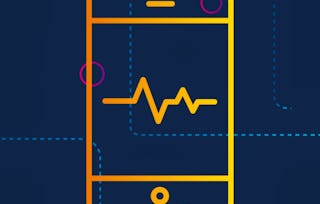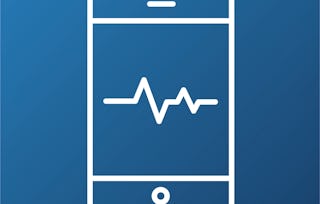This course focuses on data, evaluation methods and the economic evaluation of digital health interventions. This module focuses on key data considerations for digital health including data management, data visualisation and methods for evaluating digital health interventions. The key focus is on experimental and quasi-experimental design approaches that can be applied to evaluating digital health interventions and key considerations for the economic evaluation of digital health interventions.

Evaluation of Digital Health Interventions
Ends soon: Gain next-level skills with Coursera Plus for $199 (regularly $399). Save now.

Evaluation of Digital Health Interventions
This course is part of Digital Health Specialization

Instructor: Ana Luisa Neves
6,298 already enrolled
Included with
(58 reviews)
Skills you'll gain
Details to know

Add to your LinkedIn profile
See how employees at top companies are mastering in-demand skills

Build your subject-matter expertise
- Learn new concepts from industry experts
- Gain a foundational understanding of a subject or tool
- Develop job-relevant skills with hands-on projects
- Earn a shareable career certificate

There are 4 modules in this course
During this week, the focus will be on data considerations for digital health. This will be illustrated through examples around electronic disease surveillance and strategies for the extraction of medical data and how to present it. We will get you to think about what aspects of this would be challenging in your own context. The focus of the module then moves onto data visualisation with key case studies and examples of how to interrogate large datasets to examples of data visualisation. There will be a specific activity for you to do in this module in Tableau on visualising data.
What's included
2 videos17 readings1 assignment4 discussion prompts1 plugin
In this week, you will learn about real world case studies to improve real-time data collection and monitoring for Ebola building and the use of process evaluation to evaluate this intervention. You will then hear about interesting ways that data can be routinely used in healthcare with examples from the UK National Health Service.
What's included
4 videos5 readings2 assignments
This module focuses on methods for evaluating digital health interventions and you will focus on experimental and quasi-experimental evaluation approaches that can be applied to evaluating digital health interventions. You will then be introduced to real-world examples of some of these approaches and key considerations for randomised control trials. You will then focus on a specific example of methodological concerns of an evaluation of a digital medicine system, the limitations of this study and the NICE Evidence Framework.
What's included
3 videos8 readings1 assignment2 discussion prompts
In this week, you will learn about frameworks and models for evaluation, what robust trials are and examples of these, logic models and how to design a statistical analysis plan.
What's included
3 videos9 readings1 assignment1 peer review2 plugins
Earn a career certificate
Add this credential to your LinkedIn profile, resume, or CV. Share it on social media and in your performance review.
Instructor

Offered by
Explore more from Public Health
 Status: Free Trial
Status: Free TrialImperial College London
 Status: Free Trial
Status: Free TrialImperial College London
 Status: Free Trial
Status: Free TrialImperial College London
 Status: Free Trial
Status: Free TrialEmpower School of Health
Why people choose Coursera for their career




Learner reviews
58 reviews
- 5 stars
81.03%
- 4 stars
17.24%
- 3 stars
1.72%
- 2 stars
0%
- 1 star
0%
Showing 3 of 58
Reviewed on Dec 11, 2025
Thank you so much for such wonderful insights and knowledge sharing.
Reviewed on Dec 20, 2025
Very intresting and eye opeing
Frequently asked questions
To access the course materials, assignments and to earn a Certificate, you will need to purchase the Certificate experience when you enroll in a course. You can try a Free Trial instead, or apply for Financial Aid. The course may offer 'Full Course, No Certificate' instead. This option lets you see all course materials, submit required assessments, and get a final grade. This also means that you will not be able to purchase a Certificate experience.
When you enroll in the course, you get access to all of the courses in the Specialization, and you earn a certificate when you complete the work. Your electronic Certificate will be added to your Accomplishments page - from there, you can print your Certificate or add it to your LinkedIn profile.
Yes. In select learning programs, you can apply for financial aid or a scholarship if you can’t afford the enrollment fee. If fin aid or scholarship is available for your learning program selection, you’ll find a link to apply on the description page.
More questions
Financial aid available,
¹ Some assignments in this course are AI-graded. For these assignments, your data will be used in accordance with Coursera's Privacy Notice.





